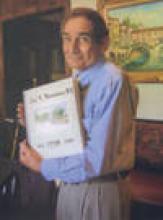It made me feel incomplete.
Feeling humbled
Recently I got a letter from a urologist regarding a former patient of mine, Robin.
Robin was diagnosed with prostate cancer about 10 years ago, when I was still his physician. Obviously, the new urologist didn’t know that I had retired. So I forwarded the note to Robin’s new family physician and called Robin to see how he was.
I still felt a tremendous sense of responsibility for Robin’s diagnosis. I had never screened him for prostate cancer. But as he reminded me at the time of his diagnosis, he and I had discussed screening. It’s just that Robin, who knows much about medicine and was always involved in his own decisions, had chosen not to pursue it.
Now 10 years later, Robin and I were catching up. As we talked, Robin revealed that he had multiple complications requiring permanent catheters and that he’d had to give up work.
“I wish you were still in practice,” he said to me. “I miss our talks.”
With that, I felt humbled.
Talking to Robin got me thinking. As doctors, we spend so much time worrying about doing the right thing and giving the right advice that we sometimes forget that we need to have confidence in our patients and their ability to make their own decisions. We need to know when to let go.
“Being there”
Jane was another person who emerged from my professional past. I had known her for years. Not only was she my patient, but I saw her when she came in with her father, sister, and mother for their appointments. Together, we had cared for her family members through their illnesses and deaths.
One day after my retirement, she called to get some advice for a problem she was having with her stepson. I listened, gave some suggestions about whom to see, and offered to stay in touch. She thanked me, saying she didn’t know who else to call.
I hung up thinking how hard it is to “be there” when you are not there.
Jane’s call reminded me of a lesson I’d given years ago to a class of first-year medical students. I had brought in a patient of mine and together, in front of the class, we discussed the doctor-patient relationship.
I asked my patient what was most important about our relationship. She said that when she was diagnosed with diabetes, I gave her my private home phone number.
I responded, “Mrs. E, in our 15 years together, how many times have you used that number?”
“None,” was her reply.
Med students, take note
I really don’t know if my retirement has been easier for my patients than for me. I certainly hope so. Part of my job was to encourage their independence and self-sufficiency. My emotional dependence on them is my problem and I suspect one that is not that uncommon among doctors. I am still teaching and doing some research. Some of my retired friends still go to grand rounds and travel to medical meetings, even though they don’t see any patients.
I have few regrets in retiring from my practice. It was the right thing to do at the right time. Do I miss it every day? Yes, but I also feel so lucky to have worked as a family physician for 42 years.
I once heard a British family physician define the family doctor as someone you can go to and talk to about anything you want. To me, the family doctor is someone who knows you—really knows you—in a way that no one else does. A family doctor is someone who can cry with a patient about a loss, not because the physician can appreciate the loss, but because the patient’s loss is the physician’s loss, too.
I wish more young medical students understood the depth of the connections we make as family physicians, and just how rewarding the work can be. If they did, there would certainly be more students choosing a career in family medicine.
Acknowledgement
I thank Nancy W. Merenstein, the first reader of everything I write and my constant supporter; Paula Preisach, manager and organizer of my academic career; and Jonathan Han, MD, David Loxterkamp, MD, Jennifer Middleton, MD, MPH, and Allen Shaughnessy, PharmD, for helpful comments and suggestions on earlier drafts of this paper.


